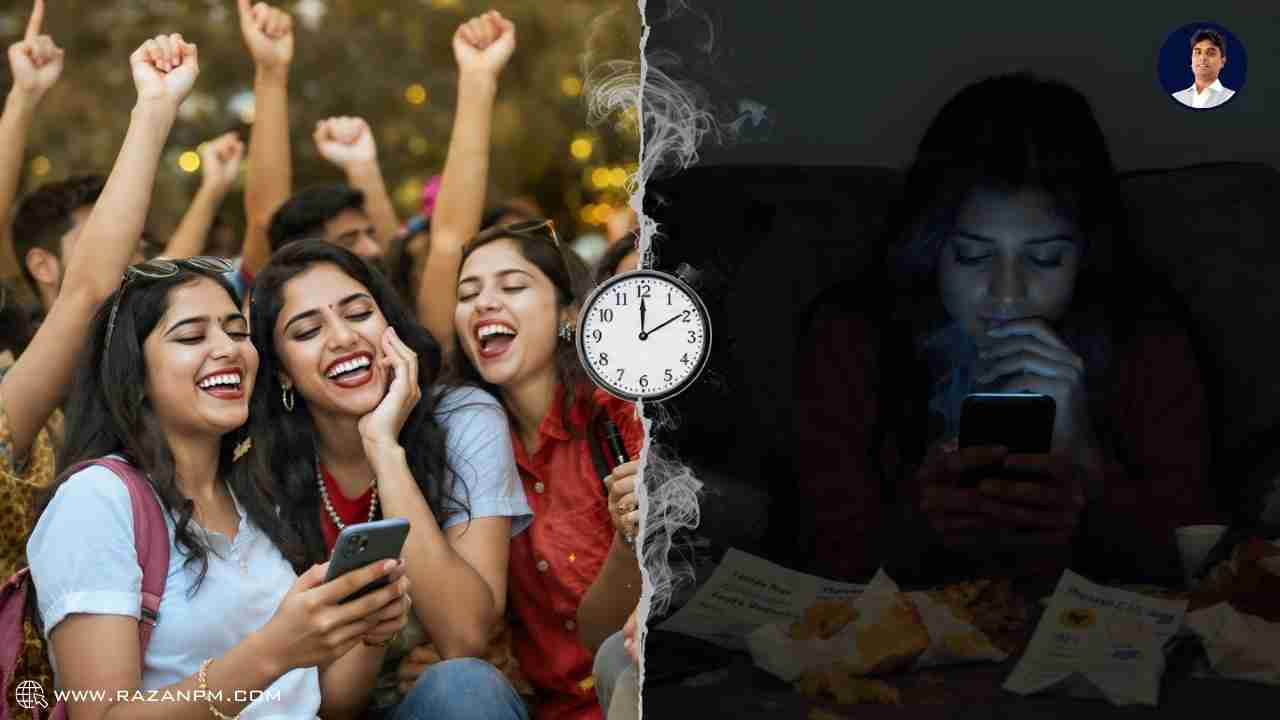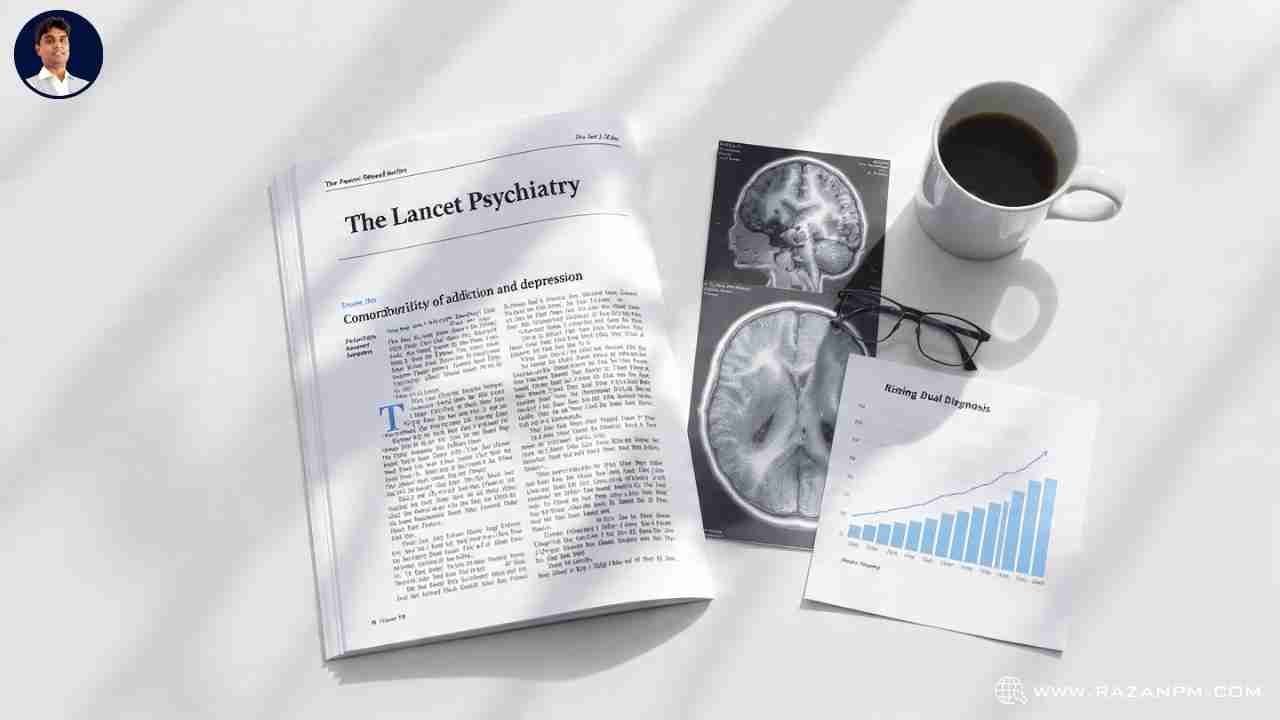Ever spilled your coffee in the morning and suddenly felt like your entire life is falling apart? Or scrolled through social media, saw everyone smiling, and thought, “Why can’t I just feel normal?”
Funny how small moments — a delay in text reply, a stressful meeting, or a lonely Saturday night — can send our minds into a spiral of negative thoughts. We laugh it off, call it “overthinking,” but deep down it’s not so funny, right? Because sometimes… those thoughts don’t go away. They linger, grow, and soon we start searching for escape.
For some, that escape becomes addiction — alcohol, nicotine, scrolling endlessly, binge eating, or even workaholism. But here’s the twist: often, addiction isn’t the problem itself. It’s a mask — hiding something deeper, darker, and more silent — Depression.
also read: 5 ways couples reignite love after along break

As a Counsellor & Mind Healer, I’ve seen countless clients say, “I don’t think I’m depressed, I just drink to relax,” or “I just smoke when I’m anxious.”
But when we dig deeper, we find the real reason — emotional pain, guilt, loss, or a sense of emptiness that addiction temporarily numbs.
You see, addiction and depression are best friends in disguise. One hides the other so cleverly that even you might not realize what’s going on beneath.
Let’s uncover the 7 signs your addiction may actually be hiding depression, so you can start seeing the truth your mind has been whispering all along.
also read: how texting culture is changing genz relationships

Whether it’s alcohol, weed, gaming, or social media — if you feel emotionally stable only after consuming or engaging in it, it’s a red flag. The substance is acting as your emotional regulator, replacing what real inner peace should do.
Ever notice how uncomfortable you get when things are quiet? You instantly need music, scrolling, or something to distract you. That discomfort is often depression whispering, “I’m still here.”
One moment you’re confident, the next you feel worthless. These emotional highs and lows are common when addiction is covering underlying depressive symptoms like emptiness and irritability.
You might think, “I’m just lazy these days.” But when your energy, interest, or enthusiasm fades for things you once loved — that’s anhedonia, a core symptom of depression.
You promise yourself “just one drink” or “only 10 minutes” — and then hours pass. This loss of control often stems from self-soothing unmet emotional pain.
Oversleeping, insomnia, overeating, or skipping meals — both addiction and depression impact your brain’s serotonin levels, disrupting biological rhythms.
After the rush fades, you feel a deep, emotional void — guilt, shame, sadness, or a strange hollowness. That’s the depression beneath addiction making itself known.
also read: the real psychology behind left onread anxiety
According to DSM-5 (Diagnostic and Statistical Manual of Mental Disorders) and ICD-11 (International Classification of Diseases), both Substance Use Disorder and Major Depressive Disorder often co-occur, a condition known as Dual Diagnosis.
Research shows that up to 60% of individuals with substance addiction also meet the criteria for clinical depression. The addiction becomes a coping mechanism — a temporary relief from emotional pain that the brain can’t process healthily.
also read: how disorders like insomnia fueldepression?

📊 Studies published in the Journal of Clinical Psychiatry and American Journal of Psychiatry reveal:
In simple words: your brain gets hooked on temporary pleasure because it’s missing the natural balance of happiness chemicals.
also read: how isolation triggers illness anddepression together?
Years ago, I worked with a young man named Aarav (name changed). He came to me saying, “I think I have a drinking problem.”
But as sessions unfolded, we found his real battle wasn’t with alcohol, it was with the grief of losing his father years ago — grief he never processed.
Each drink was his way to silence that unspoken pain. One day, during therapy, he broke down saying,
“I thought I was weak for not being able to stop drinking. But I was just trying to stop feeling.”
That moment changed both of us. I realized — many of us are fighting emotions we’ve never given names to. Addiction is just the loudest cry of that silent sadness.
also read: how to stop the cycle of pain anddepression?

Here’s something simple but powerful you can try right now:
It’s a small act, but it breaks the cycle of emotional avoidance — the very soil where addiction grows.
also read: what to do when i love you gets noreply?
Of course, one exercise can’t heal years of emotional pain. Real transformation needs guided emotional processing, behavioral therapy, and inner healing.
But this small step can open the door — helping you see that what you call “addiction” might just be your mind’s way of asking for help.
You don’t have to do it alone. Healing is not about giving up your coping habits overnight — it’s about understanding why you needed them in the first place.
also read: how fear of rejection kills realconnection?
If while reading this, something inside you whispered, “That’s me,” — then please know this:
You are not broken. You are hurting, and that’s okay.
✨ As a Govt.Recognized Counsellor & Mind Healer, I’ve walked with many people through this same shadow. There is a way out — gently, safely, and without judgment.
If this feels familiar, you don’t have to figure it out alone.
👉 Book your consultation here — let’s start your healing journey, together.
👉 Begin Your Journey with a 1 on 1 Consultation
👉 Begin Your Journey with a 1 on 1 Consultation

Yes. Many people use substances like alcohol, drugs, or even behaviors like gaming or binge-eating to numb emotional pain. These coping habits temporarily hide symptoms of depression such as sadness, guilt, and emptiness — but over time, they actually make the depression worse.
also read: why timing turns simple talks intobig arguments?
Early signs include losing interest in things you love, mood swings, feeling “normal” only after using substances, and avoiding silence or alone time. You may also notice disturbed sleep, fatigue, and a constant emotional void.
also read: how everyday pressure breaks yourmind?
Stress usually fades when a problem is solved, while depression lingers — it affects your motivation, appetite, relationships, and energy. If you rely on alcohol, smoking, or overworking to feel better, it might be depression disguised as coping.
also read: do voice notes kill realconversations?
According to the DSM-5 and ICD-11, depression and substance use often co-occur, known as a dual diagnosis. This means both conditions need to be addressed together — not separately — through therapy, medication, and emotional healing.
also read: how bias turns into deep depression?
Absolutely. Cognitive Behavioral Therapy (CBT), Mindfulness Therapy, and Trauma Healing can help uncover suppressed emotions, build healthier coping mechanisms, and reduce dependence on substances. A Counsellor & Mind Healer can guide you through this process safely.
also read: how to tell if emotional separationhas already started?
Yes, if your addiction and depression are mild to moderate, therapy, emotional regulation exercises, and consistent mental health support can work effectively. Severe cases, however, might need a structured rehab program under professional supervision.
also read: why kind words create misunderstanding?
Begin with self-awareness — notice what triggers your urge to use, and what emotions you’re avoiding. Try journaling, “name-it-to-tame-it” exercises, or guided therapy sessions. Healing starts the moment you stop running from your feelings.
also read: how caregiving triggers hidden depression?
